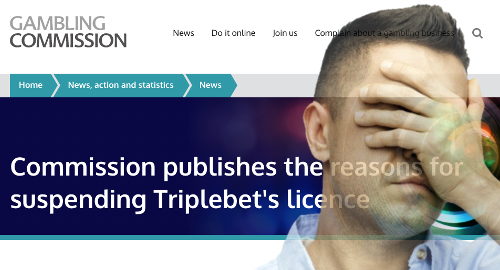 The UK gambling regulator suspended betting exchange Matchbook’s license due to “serious failings” in its social responsibility and anti-money laundering (AML) obligations.
The UK gambling regulator suspended betting exchange Matchbook’s license due to “serious failings” in its social responsibility and anti-money laundering (AML) obligations.
On Wednesday, the UK Gambling Commission (UKGC) published details on its February 17th decision to suspend the license of Matchbook’s parent company Triplebet Ltd. The UKGC said the suspension will remain in place “until Triplebet can prove it has implemented the remedial measures” the UKGC requires.
The UKGC said it found deficiencies in Triplebet’s AML policies, including a failure to (a) establish objective circumstances that would trigger a customer’s risk reclassification, (b) set out specifics on when enhanced due diligence measures were required for certain high-risk customers, (c) provide guidelines for when to undertake source of funds/wealth checks, and (d) require adequate recordings of customer interactions.
Triplebet failed to update its AML policy for over three years while claiming that it relied on staff to ensure effective implementation of these policies, despite the company’s failure to provide staff with sufficient guidance on how to implement its policies.
In one outsized example of these failings, the UKGC said Triplebet allowed a customer to wager over £2m in a single day “without any source of funds or source of wealth being required.”
Another customer, a relative of whom had been convicted of gambling-related offences, lost £714k in one year without Triplebet conducting any enhanced due diligence.
Yet another customer, for which Triplebet carried out no checks other than verifying his identity and address, was allowed to deposit and “shortly afterwards” withdraw a hefty sum without any gambling activity, a classic warning sign of potential money laundering.
Triplebet failed to prepare any risk profiles or check the source of funds of Matchbook’s top ten customers, while also failing to record any meetings or interactions with these customers. Triplebet argued that some or all of these players were “professional gamblers” but couldn’t provide any documentary evidence to support this claim.
A betting syndicate, whose “lead contributor” was a pro gambler with a beneficial interest in Triplebet, matched over $55m in bets on Matchbook in an 18-month period without any documented risk assessment. Triplebet eventually suspended syndicate activity until it could establish a proper due diligence policy for such groups.
Triplebet allowed customers to transfer money to other customers or accounts, including abroad, without tagging these transactions with “the kind of controls which would attach to banking transactions for similar amounts and creating an appearance of legitimate monies to be withdrawn or spent.”
In some cases, these account-to-account transactions occurred “with little or no play” by the depositing customer. Following the UKGC’s intervention, Triplebet halted these transactions for its UK customers in May 2018 but non-UK customers were allowed to carry on as usual until January 2019.
The UKGC rejected a number of Triplebet arguments in its own defense, including that, since no hard evidence of money laundering had been detected, the company’s business model presented no significant money laundering risk. The UKGC also took issue with Triplebet’s claim that the regulator had failed to provide “a greater level of guidance as to the standards it required.”
Triplebet’s social responsibility shortcomings included a customer who registered, played and self-excluded on the same day, and six months later was allowed to reopen his account, play for 10 hours a day for two straight days and nights, losing “a large sum” in the process, “all without any monitoring or interaction.”
Triplebet also submitted what it claimed was its social responsibility policy, but which turned out to be a customer-facing document that didn’t comply with UKGC codes. Triplebet then claimed to have a more comprehensive social responsibility policy “but was unable to locate it.”
The UKGC said Wednesday that it was imposing a £739k fine on Triplebet, as well as additional license conditions, including employing auditors to submit reports every six months confirming that the the regulator’s recommended changes are being implemented in full.
Compared to the eight-figure penalties recently imposed on Betway and Caesars Entertainment, Matchbook appears to have gotten off relatively lightly here. But the delicious fodder that Matchbook’s activities will provide for anti-gambling critics will cost the gambling industry dearly in the weeks and months to come.